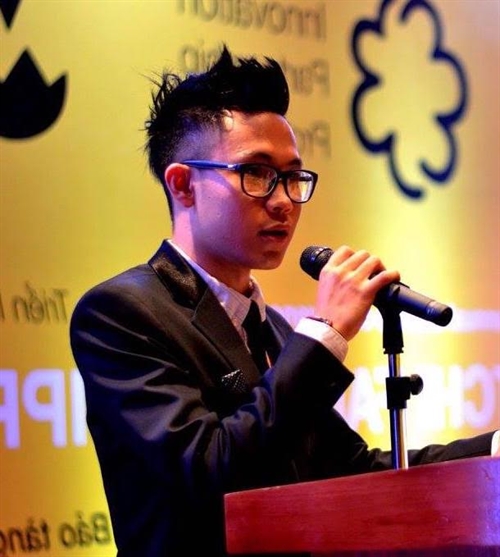 Inner Sanctum
Inner Sanctum

" />Phạm Quốc Đạt, co-founder and CEO of HATCH! Program and who was listed among Forbes Việt Nam ’30 under 30’ in 2016, spoke to Lê Thu Hương about HATCH’s entrepreneurship schemes and what it takes for Việt Nam’s startup ecosystem to move forward.
 |
Phạm Quốc Đạt, co-founder and CEO of HATCH! Program and who was listed among Forbes Việt Nam ’30 under 30’ in 2016, spoke to Lê Thu Hương about HATCH’s entrepreneurship schemes and what it takes for Việt Nam’s startup ecosystem to move forward.
As one of Việt Nam’s most well-known startup leaders, Phạm Quốc Đạt founded HATCH! with three friends in 2012. HATCH! now offers community building and incubator programmes, connects startups with angel investors and runs an annual national startup conference called HATCH! FAIR.
Inner Sanctum: What differentiates HATCH! VENTURES from other incubators?
HATCH! was founded in December 2012 as a startup community builder. Since then, we have been actively promoting the entrepreneurship ecosystem in Việt Nam.
Since 2016, we have established HATCH! VENTURES as a key accelerator for technology startups. We focus 100 per cent on the quality of the startups, while caring about social impacts at the same time. By ratio, we have the highest incubation staff per incubated company in Việt Nam, which means that we work with each company very closely and hands-on, ensuring they can leverage all of our resources. Over the last three years, we have worked with over 200 companies, and many have raised millions of US dollars in funding.
Inner Sanctum: As someone who has been actively involved in the Việt Nam start-up scene, what do you think are the missing pieces of the puzzle in the ecosystem for it to move to the next level?
I think what’s missing in the country are two things. First of all, there are not enough startups registered in the ecosystem tapping into professional resources like incubation. Too many entrepreneurs try to work alone, and for that reason they are quite possibly also making 100 per cent avoidable or preventable mistakes.
Secondly, there is a funding gap between bootstrapping and institutional investors. This gap is filled in mature startup ecosystems by strong “angel” investment networks. Right now in Việt Nam, angel investment is a new topic, and would-be angel investors are out there, but need to be reached, made aware, educated, and given opportunities to try investment in early-stage innovation-based enterprises.
We are working to educate angel investment to Vietnamese investors, as well as to gather them under the same initiative to invest into potential Vietnamese companies.
Inner Sanctum: It’s now the norm for Vietnamese start-ups to set up their companies in Singapore. What do you think the Vietnamese Government can do to reverse this trend?
There are many advantages for serious Vietnamese companies to register legally in Singapore. There is less paper work, the tax is preferable, and it is much more transparent to investors. It’s hard to think that in the short term any change will take place in Việt Nam.
To be able to be as competitive as Singapore, it requires a lot of effort and many years of excellent implementation. I would argue that while we need to change as soon as possible, we should take a look at the resources that we already have and leverage these resources, such as many English speaking young people, high Internet and smartphone penetration and a young population, etc.
Inner Sanctum: Youth unemployment has been a major concern. How do you think the development of startups in Việt Nam could address youth unemployment?
Entrepreneurship ecosystem building is not a short-term employment or talent-development solution, but rather a long-term employment solution. Surviving, strong startups do eventually become small-to-medium enterprises (SMEs) employing hundreds of people. Growing SMEs can eventually become multi-national corporations (MNCs), employing thousands. But SMEs and MNCs need a talent pool of people who have experience working in SMEs and MNCs.
It is very hard to go from a startup to SME and MNC with no experience in the latter. The typical, urban-living youth should still seek an employment-based career, and excel at one specialised skill. Thus, they can maximise personal branding, personal income growth and long-term financial stability. Entrepreneurship is only for the brave and the determined.
Rarely does the typical urban-living young person jump from high school or university into startups. In fact, this may not be the best career choice for the average young person. The success of an innovation-based enterprise hinges on small teams of highly intelligent, highly motivated and creative leaders.
I believe that there is no “typical way” of starting up a business. And a business can also be the cause of unemployment.
Inner Sanctum: There are probably many startup ideas from young Vietnamese people but implementation is always a major challenge. Without major efforts, ideas just stay on paper. How important is it for young people to understand that building a startup is not always glamorous like depicted in the media?
It is critically important, and the media can help. Startup stories are inspirational and motivational, but the underlying discipline, rigour, methodological practice, and struggles do not make the best-selling stories. The rapid rise to wealth makes a great story. It is rare. Outside of the rare cases, entrepreneurs must apply themselves to following a tried-and-true, formal "commercialisation process", like the ones developed for use in our HATCH! Incubator programme.
Inner Sanctum: Can you tell us more about HATCH! FAIR 2016 and Social Innovation Camp, the two biggest projects that HATCH are running this year?
HATCH! FAIR 2016 is our fourth annual startup conference and exhibition, organised by HATCH! PROGRAM. It is the only national startup event in Việt Nam, with dedicated international partic
The Social Innovation Camp took place in August in the three cities. Ten teams will be selected to the final round at HATCH! FAIR 2016 on Oct 7-8 in HCM City. Social Innovation Camp is one of three competitions prior to HATCH! FAIR. With help from UNDP Việt Nam and other partners such as the ADB, Oxfam, it is a competition focusing 100 per cent on impact startups.
We are looking for innovations in healthcare, the environment, food and community empowerment. This was expanded from our previous cooperation with UNDP on the competition called Hackathon for Social Good last year, which mobilised more than 100 young people.
The competition in 2015 resulted in two innovative ideas, one was an app called For People (4P), which collects citizen feedback on public services and GT-101, an educational tool to encourage citizens to report misconduct by traffic police. We hope ideas from the camp this year can be scaled up to make a difference across the country. VNS




